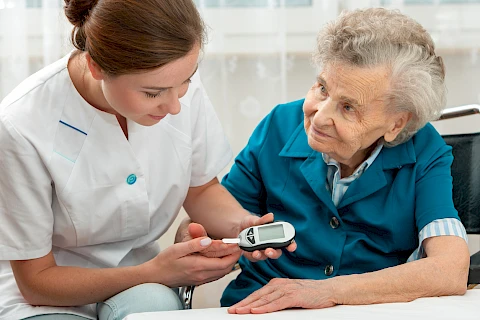
Diabetes is a common health issue that many seniors face. It's crucial to catch and manage it early. Prediabetes, a condition that signals high blood sugar levels but not yet full-blown diabetes, is a warning sign. As a family caregiver, you can help notice changes in your senior loved one's health, especially if they also have dementia. Learning the differences between prediabetes and diabetes will help you support your loved one and take the necessary steps for their well-being. Senior Helpers Yardley will outline what family caregivers need to know.
Breaking Down Prediabetes and Diabetes
Prediabetes means the blood sugar is higher than normal but not yet at diabetic levels. If left unchecked, it can lead to type 2 diabetes. While prediabetes itself doesn't usually cause symptoms, it's a warning. Diabetes, on the other hand, is a serious condition that can lead to various health complications.
Common risk factors in seniors include being overweight, leading a sedentary lifestyle, and having a family history of diabetes. Seniors with dementia may have an added challenge as memory issues can complicate managing their condition.
Identifying Signs and Symptoms
In prediabetes, watch for increased thirst, frequent urination, and sudden weight gain or loss. As prediabetes transitions to diabetes, these symptoms may become more pronounced. You might also see more frequent infections or slow-healing sores.
For seniors with dementia, look for behavioral changes. They may become more confused if their blood sugar is high or too low. These shifts can be subtle but are crucial to notice, as they can affect how they respond to daily activities and care routines.
Effective Care Practices
A balanced diet is key, focusing on whole grains, vegetables, and lean proteins while limiting sugary snacks and drinks. Encourage regular physical activity. Even gentle exercises, like walking or chair exercises, can improve health. Seniors should always consult a doctor before starting a new fitness routine.
Monitor blood sugar levels regularly to manage the condition effectively. This helps adjust diets and medications. Consistent routines can ease stress and help them remember essential tasks. Using pill organizers or setting reminders for meals and activities can help maintain stability.
When to Seek Medical Advice
Contact a healthcare provider if you notice symptoms worsening or new issues like persistent dizziness or blurred vision. Regular check-ups allow you to discuss any observed changes and adjust care plans.
Effective communication with healthcare providers is crucial. Bring a list of medications, symptoms you've noticed, and questions to the appointments. This can help healthcare professionals offer the best advice and treatment.
Contact Senior Helpers Yardley for Help Managing Senior Health Conditions
As a family caregiver, you are in a unique position to help your senior loved one manage prediabetes and diabetes. Staying informed and vigilant can make a significant difference in their health outcomes. Don't hesitate to seek help when needed. For support with senior care services, contact us at Senior Helpers Yardley, serving Southampton, Bensalem, Langhorne, Morrisville, and Bucks County. Your proactive steps today can lead to healthier tomorrows for your loved ones.